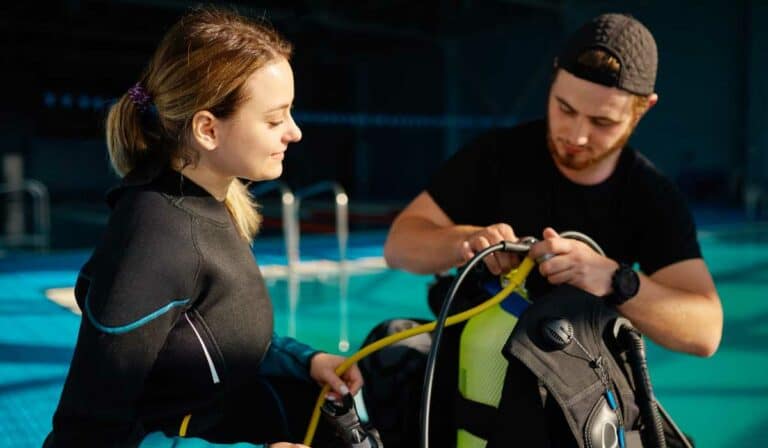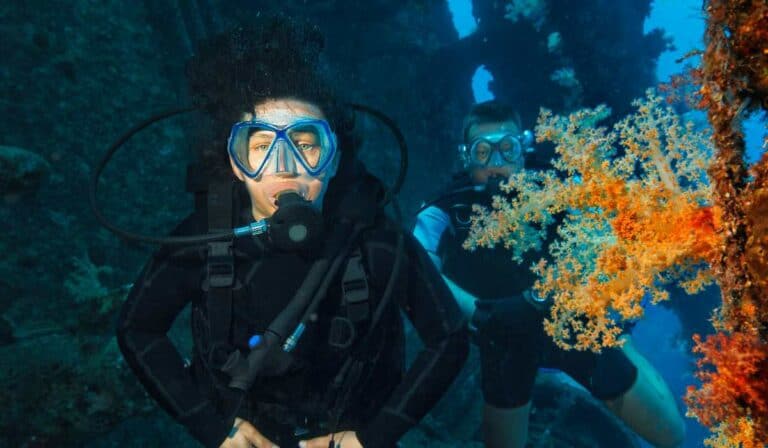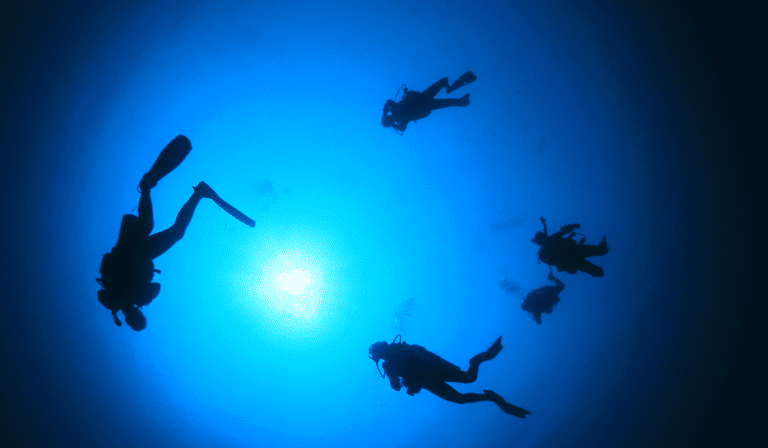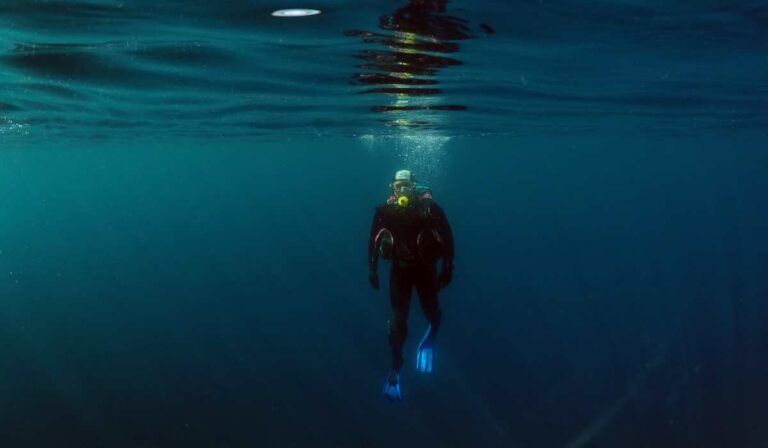Wearing Glasses While Scuba Diving
For those with vision impairments, wearing glasses while scuba diving can open up a new realm of underwater exploration. This post will explore various options and considerations for divers who wear glasses or contact lenses.
We’ll dive into the benefits of wearing glasses during your underwater adventures and discuss different types of eyewear suitable for scuba diving. Furthermore, we’ll introduce you to special masks designed specifically for divers with prescription needs.
In addition, this post will provide tips on adjusting to wearing glasses underwater and guide you through choosing the right mask and eyewear based on your unique requirements. We’ll also cover essential care and maintenance practices to ensure that your mask remains in top condition throughout its lifespan.
Last but not least, we’ll address common issues faced by individuals when wearing glasses while scuba diving and offer practical solutions to overcome these challenges. By following our expert advice, you can confidently embark on an unforgettable underwater experience without compromising your vision or comfort.
Table of Contents
1. Benefits of Wearing Glasses While Scuba Diving

Scuba diving is an exhilarating and immersive experience that allows you to explore the underwater world in a way few other activities can match. However, for those who wear glasses, it might seem like this adventure is out of reach due to concerns about vision correction underwater. Fortunately, there are solutions available that allow scuba divers with glasses to enjoy clear sight while exploring the depths.
In this section, we will discuss some of the key benefits associated with wearing glasses or corrective eyewear while scuba diving:
- Better Visibility: The most obvious benefit of wearing corrective eyewear during your dive is improved visibility. With proper vision correction, you’ll be able to see marine life more clearly and appreciate all the intricate details that make up our planet’s fascinating aquatic ecosystems.
- Safety: Clear vision isn’t just important for enjoying your dive; it’s also crucial for safety reasons. Being able to see well ensures you can read gauges accurately, navigate effectively through unfamiliar environments, and communicate with your fellow divers using hand signals or written messages on a slate.
- Comfort: When you’re comfortable during a dive – including having clear vision – you’re likely to feel more relaxed and at ease in the water. Reducing stress levels while diving not only improves the experience but also conserves air due to lessened breathing patterns.
- Fewer Barriers To Entry: By making use of specialized masks or prescription lenses designed specifically for scuba diving (which we’ll cover later), individuals who wear glasses no longer need to miss out on incredible underwater adventures simply due to their need for corrective eyewear.
It is vital to opt for suitable eyewear or mask in order to take advantage of these advantages. In the following sections, we’ll explore various options available and provide tips on how to make an informed decision.
Eyewear can be a beneficial addition to scuba diving, allowing for improved visibility of the ocean’s wonders. Therefore, it is important to be aware of the different types of eyewear available for scuba diving in order to make an informed choice.
The Key Takeaway:
Wearing glasses while scuba diving can improve visibility, safety, and comfort during the dive. It also reduces barriers to entry for those who wear glasses by using specialized masks or prescription lenses designed specifically for scuba diving. Choosing the right type of eyewear is essential to fully enjoy these benefits.
Click here to read about 12 Best Places for Scuba Diving in Florida
2. Types of Eyewear for Scuba Diving
For those who wear glasses and want to explore the underwater realm, there are various eyewear choices that guarantee a pleasant and clear experience. Let’s dive into some of these options:
Prescription Dive Masks
Prescription dive masks are specifically designed for those who need corrective lenses while scuba diving. These masks come with built-in prescription lenses that match your eyeglass prescription, providing you with crystal-clear vision underwater.
Custom-Made Lenses
If you have a unique or complex prescription, custom-made lenses might be the best option for you. Many optical shops can create customized lenses that fit perfectly into your chosen dive mask.
Contact Lenses
Another popular option is wearing contact lenses while scuba diving. Soft daily disposable contacts work well as they allow more flexibility in case water gets inside the mask during your dive. However, it’s essential to consult with an eye care professional before using contacts underwater due to potential risks such as infection or lens displacement.
Gas Permeable (GP) Contacts vs Soft Contacts
- Gas Permeable (GP): These rigid contact lenses may not be suitable for use during scuba diving because they can easily dislodge if water enters the mask.
- Soft Contacts: Ideal for scuba diving, soft contacts are more comfortable and less likely to dislodge during your dive. Daily disposable lenses are recommended as they can be discarded after each use.
Bifocal or Progressive Lenses
If you require reading glasses in addition to distance correction, bifocal or progressive lenses may be the solution. Some dive masks come with built-in bifocal lenses, while others have removable magnifying inserts that can be added to the mask’s lower portion.
Divers can experience a secure, pleasant dive with the appropriate eye protection. Special masks are available for those who wear glasses while diving to ensure they have an enjoyable experience underwater.
The Key Takeaway:
Learn about the different eyewear options available for scuba divers who wear glasses, including prescription dive masks, custom-made lenses, and contact lenses. Soft daily disposable contacts are recommended for underwater use to avoid potential risks such as infection or lens displacement. Bifocal or progressive lenses may also be an option for those who require reading glasses in addition to distance correction.
3. Special Masks for Scuba Divers with Glasses

If you wear glasses and want to enjoy the underwater world while scuba diving, there are special masks available that cater specifically to your needs. These masks come with various options such as prescription lenses or inserts, ensuring clear vision throughout your dive.
Prescription Lens Masks
Prescription lens masks are a popular choice among divers who require corrective eyewear. These custom-made masks feature lenses tailored to match your exact prescription, providing optimal clarity underwater. It is vital to have a current eye exam prior to obtaining one of these custom masks, which can be bought from numerous dive stores or internet vendors.
Mask Inserts
An alternative option is using mask inserts, which consist of separate frames designed to hold prescription lenses within a standard scuba mask. This solution allows you more flexibility in choosing a mask style and fit while still accommodating your need for corrective eyewear.
- Generic Inserts: Some companies offer generic inserts that fit into most standard scuba diving masks on the market. They come in pre-set diopter strengths (e.g., -1, -1.5), making them suitable for those with simple prescriptions.
- Custom Inserts: For individuals with more complex prescriptions involving astigmatism or bifocals, custom-made inserts may be necessary. These tailor-made solutions ensure precise vision correction based on your specific requirements.
Full Face Masks with Prescription Lenses
For divers who prefer full-face masks, some models can accommodate prescription lenses or inserts. These masks cover your entire face, including the eyes, nose, and mouth, providing an integrated regulator for easier breathing. With this option, you’ll enjoy a more immersive experience while maintaining clear vision underwater.
Now that you know about the various special mask options available for scuba divers with glasses, let’s explore some tips on adjusting to wearing corrective eyewear underwater in the next section.
Scuba divers with glasses can now take advantage of specially designed masks, allowing them to enjoy the wonders of the deep while still having clear vision. Advice on acclimating to donning eyeglasses while scuba diving is here to be examined.
The Key Takeaway:
Scuba divers who wear glasses can enjoy the underwater world with special masks that cater to their needs. Prescription lens masks and mask inserts are available, allowing for clear vision while diving. Full-face masks with prescription lenses or inserts provide an immersive experience while maintaining optimal clarity underwater.
Click here to read about 7 Best Places for Scuba Diving in the USA
4. Tips for Adjusting to Wearing Glasses Underwater
Acclimating to wearing glasses while diving can be daunting, but with the proper tips and instruction, you’ll soon feel comfortable in your eyewear or mask and enjoy a remarkable underwater experience. However, with the right tips and guidance, you’ll quickly become comfortable with your new eyewear or mask and enjoy an incredible underwater experience. Here are some helpful tips on how to adjust to wearing glasses underwater:
a) Practice in Shallow Water First
Before venturing into deeper waters, practice using your scuba diving mask and corrective lenses in shallow water or even a swimming pool. This will help you get used to the feeling of wearing glasses underwater and allow you to make any necessary adjustments before going on a full dive.
b) Make Sure Your Mask Fits Properly
A well-fitting mask is crucial when scuba diving with glasses. Ensure that the mask seals tightly around your face without causing discomfort or pressure points. You may need to try several masks before finding one that fits comfortably and securely.
c) Defog Your Lenses Before Diving
Fogging can be a common issue when wearing glasses while scuba diving. To prevent this from happening, apply an anti-fog solution like Jaws Quick Spit Antifog Spray onto both sides of your lenses before entering the water.
- Note: Be sure to defog not only the inside but also the outside surfaces of prescription lens inserts as well.
d) Equalize the Pressure in Your Mask Regularly
As you descend during your dive, it’s essential to equalize the pressure inside your mask by gently exhaling through your nose. This will help prevent any discomfort or potential damage to your glasses and ensure a clear view throughout your dive.
e) Keep Your Head Position Neutral
Maintaining a neutral head position can help minimize water leakage into the mask and reduce strain on both the mask strap and eyewear. Avoid tilting or turning your head excessively while diving, as this may cause water to enter the mask.
f) Stay Relaxed and Breathe Normally
Staying relaxed is key when scuba diving with glasses. Focus on breathing normally through your regulator, which will help keep you calm and maintain proper buoyancy underwater.
By following these tips, adjusting to wearing glasses underwater while scuba diving should be an enjoyable experience that allows you to fully appreciate all of the amazing sights beneath the surface.
With a little practice and patience, wearing glasses while scuba diving can be made much easier. Gearing up with the proper equipment can give you assurance to dive deep into the sea.
The Key Takeaway:
To adjust to wearing glasses underwater while scuba diving, practice in shallow water first and ensure your mask fits properly. Defog your lenses before diving, equalize the pressure in your mask regularly, keep a neutral head position, stay relaxed, and breathe normally to fully appreciate all of the amazing sights beneath the surface.
5. How to Choose the Right Mask and Eyewear for Your Needs

Selecting the ideal mask and eyewear for your underwater explorations is essential, especially if you do specs. When deciding on the right mask and eyewear for your diving needs, there are numerous elements to take into account such as comfortability, size, prescription intensity, and individual preferences. In this section, we will guide you through the process of selecting the perfect combination of mask and eyewear that best suits your needs.
Determine Your Prescription Strength
The first step in choosing suitable eyewear for scuba diving is determining your prescription strength. You can consult with an optometrist or refer to a recent eye exam report to get accurate information about your vision requirements.
Evaluate Different Types of Scuba Diving Masks
There are various types of scuba diving masks available on the market designed specifically for those who wear glasses:
- Dive masks with built-in corrective lenses: These masks come with pre-installed corrective lenses that match common prescription strengths.
- Dive masks compatible with custom-made lens inserts: Some dive masks allow users to replace their standard glass panels with customized prescription lens inserts made by an optician or specialized manufacturer.
- Dive masks designed for use over regular glasses: These unique dive masks feature larger frames that accommodate most sizes of everyday eyeglasses worn underneath them while maintaining a proper seal around the face.
Consider Comfort and Fit
Your chosen mask should be comfortable enough to wear during extended periods underwater without causing discomfort or irritation on your face. Make sure to try on different masks and adjust the straps for a secure fit that doesn’t feel too tight or loose.
Test Your Mask and Eyewear Combination
Before your dive, it is essential to assess the compatibility of your mask and eyewear in a controlled environment like a pool, ensuring no issues arise such as fogging, leaking, or discomfort. This will help you identify any potential issues such as fogging, leaking, or discomfort while wearing the mask underwater.
Click here to read about 5 Best Places for Scuba Diving in Hawaii
Seek Professional Advice
If you’re unsure about which mask and eyewear option is best for you, consult with an experienced PADI-certified dive instructor or optometrist specializing in sports vision who can provide personalized recommendations based on your unique needs.
Taking these factors into consideration will ensure that you choose the right mask and eyewear for your scuba diving experience while wearing glasses. By investing time in selecting suitable equipment tailored to your specific requirements, you’ll be able to fully enjoy exploring the underwater world without compromising comfort or safety.
The Key Takeaway:
Choosing the right mask and eyewear for scuba diving while wearing glasses is crucial. Consider factors such as prescription strength, comfort, fit, and testing your equipment before embarking on a dive. Seek professional advice from an experienced PADI-certified instructor or optometrist specializing in sports vision if unsure about which option is best for you.
6. Care and Maintenance of Your Mask and Eyewear
Taking proper care of your mask and eyewear is essential to ensure clear vision, comfort, and durability while scuba diving with glasses. Follow these tips for maintaining your equipment in top condition:
A. Cleaning Your Mask Regularly
After each dive, it’s crucial to clean your mask thoroughly. Rinse it with fresh water to remove saltwater residue or chlorine from pool dives. Use a mild soap or specialized mask cleaner if necessary, but avoid using harsh chemicals that can damage the silicone.
B. Storing Your Mask Properly
When not in use, store your mask in a cool and dry area where it is shielded from direct sunlight, ensuring its lenses remain unscathed. Keep it in its protective case or box to prevent scratches on the lenses.
C. Inspecting Your Equipment Before Each Dive
- Lenses: Check for any cracks or scratches that may affect visibility underwater.
- Silicone Skirt: Examine the skirt for tears or signs of wear that could cause leaks during dives.
- Eyewear Inserts: Ensure they are securely attached inside the mask without obstructing vision.
- Mask Straps & Buckles: Make sure straps are free from fraying and buckles function properly for easy adjustments underwater.
D. Defogging Techniques: Prevent Foggy Lenses Underwater
Fogging is a common issue faced by divers wearing glasses while scuba diving due to the temperature difference between the water and your face. To prevent fogging, you can use a commercial defogger or apply some home remedies like baby shampoo or saliva on the inner surface of lenses before diving.
E. Replacing Worn-Out Parts
Regularly inspect your mask and eyewear for signs of wear and tear, such as cracked lenses or deteriorating silicone skirts. Replace any worn-out parts promptly to ensure optimal performance during dives.
Maintaining your scuba diving mask and eyewear in good condition will not only prolong their lifespan but also enhance your underwater experience by providing clear vision and comfort throughout each dive.
Proper care and maintenance of your mask and eyewear are essential to ensure safe, enjoyable scuba diving experiences. With that in mind, let’s look at some common issues you may encounter when wearing glasses while scuba diving, as well as how to troubleshoot them.
The Key Takeaway:
To ensure clear vision, comfort, and durability while scuba diving with glasses, it is essential to take proper care of your mask and eyewear. This includes cleaning the mask regularly, storing it properly, inspecting equipment before each dive for wear and tear, using defogging techniques to prevent foggy lenses from underwater, and replacing worn-out parts promptly. By maintaining your scuba diving gear in good condition you can enhance your underwater experience by providing clear vision and comfort throughout each dive.
Click here to read about Is Scuba Diving Dangerous? Exploring Risks and Safety Tips
7. Troubleshooting Common Issues When Wearing Glasses While Scuba Diving

Don’t let the potential difficulties of wearing glasses while scuba diving prevents you from experiencing the wonders beneath the surface. In this section, we’ll discuss the issues that may arise while wearing glasses underwater and provide solutions to help you enjoy your dive.
Fogging Masks
Fogging is a common issue faced by many divers, especially those who wear glasses. This happens when the warm air inside the mask meets the cold water outside, causing condensation to form on your lenses or prescription inserts. To prevent fogging:
- Clean and defog your mask before each dive using commercial defoggers or natural alternatives like baby shampoo.
- Ensure proper fit and seal of your mask to minimize water ingress which can contribute to fogging.
- Avoid exhaling through your nose as it increases the humidity inside the mask.
Leaking Masks
A leaking mask can be frustrating for any diver but particularly so for those wearing glasses or prescription inserts. Here are some tips to ensure a leak-free experience:
- Select a high-quality scuba diving mask designed specifically for eyeglass wearers (as discussed in Heading 3).
- Test the fit of your chosen mask, ensuring it creates an effective seal around your face without being too tight or uncomfortable.
- Maintain proper positioning of straps and buckles to avoid shifting during your dive.
Discomfort and Pressure on the Face
Wearing glasses while scuba diving can sometimes cause discomfort or pressure on your face, particularly around the nose and forehead. To alleviate this issue:
- Choose a mask with soft silicone skirts that conform to the contours of your face for maximum comfort.
- Avoid over-tightening straps as it can create unnecessary pressure points.
- If possible, opt for prescription inserts instead of wearing your regular eyeglasses inside the mask, as they tend to be more comfortable and less bulky.
By addressing these common issues proactively, you’ll be well-equipped to enjoy an incredible underwater experience without compromising on visual clarity. Remember that practice makes perfect – so don’t hesitate to experiment with different masks, eyewear options, and techniques until you find what works best for you.
The Key Takeaway:
When wearing glasses while scuba diving, common issues like fogging masks, leaking masks, and discomfort on the face can arise. To prevent these problems from ruining your dive experience, clean and defog your mask before each dive, select a high-quality mask designed for eyeglass wearers, and choose prescription inserts instead of regular eyeglasses if possible.
Faqs about Wearing Glasses While Scuba Diving
Can You Wear Glasses While Scuba Diving?
Wearing regular glasses while scuba diving is not recommended due to the risk of losing them and the inability to create a proper seal with your mask. Instead, divers who need vision correction should use prescription masks or contact lenses.
How Do People Who Wear Glasses Dive?
People who wear glasses can still enjoy scuba diving by using either prescription masks that have corrective lenses built-in or by wearing soft contact lenses under their standard dive mask. Both options provide a clear underwater vision for those with refractive errors.
How Do You Wear Glasses with a Scuba Mask?
You cannot directly wear glasses with a scuba mask. However, there are special prescription masks available that come equipped with corrective lenses similar to your eyeglasses prescription. Alternatively, you can also opt for wearing soft contact lenses underneath your regular dive mask.
The Golden Rule of Scuba Diving
The golden rule of scuba diving is “Never hold your breath.” Holding one’s breath while ascending from depth can lead to lung overexpansion injuries due to changes in pressure. Always remember to breathe continuously and naturally throughout your entire dive.
For those interested in scuba diving, it is important to note that proper vision correction is crucial for a safe and enjoyable underwater adventure. Whether you choose to wear prescription masks or contact lenses, consult with a diving instructor or visit your local dive shop to find the best option for your needs.
Conclusion
In conclusion, wearing glasses while scuba diving is possible with the right eyewear and masks. There are different types of eyewear available for divers with poor eyesight, including prescription masks and contact lenses. It’s important to choose the right mask and eyewear for your needs, adjust to wearing them underwater, and properly maintain them.







